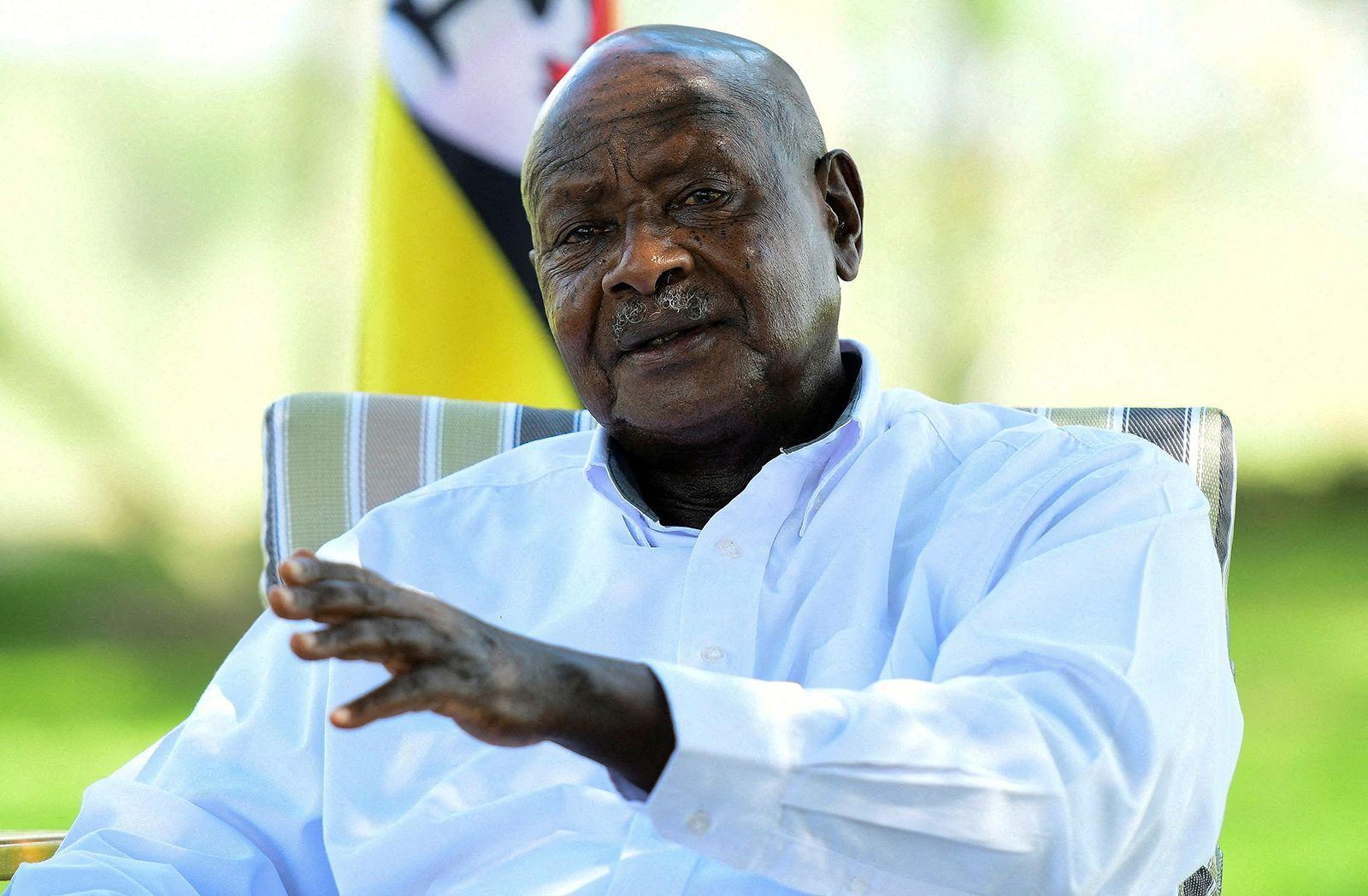Africa-Press – Uganda. President Museveni has dismissed key concerns that were raised by the traders before they went on strike two weeks ago, ahead of his meeting with government officials from several ministries and the Uganda Revenue Authority (URA) today.
Last week, traders went on strike protesting a range of issues including the implementation of the Electronic Fiscal Receipting and Invoicing Solution (Efris), its enforcement and penalties of defaulters, high taxes on imported garments, bank agency notices issued by URA on traders’ accounts and corruption among tax enforcement personnel.
Traders said Efris was complicated and needed IT skills to operate it, which they don’t have. They also accused manufacturers of dealing directly with the retailers.
Museveni yesterday said traders are dealing in imported goods thus keeping Uganda in slavery when it wastes all the forex earnings it gets from exports of imported products.
“This is on account of Uganda and Africa, producing raw materials which, then, are processed into finished products abroad and brought back to us and other consumers, at much higher prices,” Mr Museveni said.
President Museveni is to meet government officials in the trade and revenue sectors today before his planned general meeting with traders at Kololo Ceremonial Grounds on May 4.
Mr Museveni said he can’t allow haemorrhage of Uganda’s forex and donating jobs to foreign countries.
He added that the rationale of taxes is partly to stop the outflow of forex from Uganda’s economy.
“What, then, do we tax? We tax, mainly, ebitujjamu omusayi (blood donation – such as imports of consumer goods such as textiles, perfumes, spirits, cars) and ebyokwejalabya (pleasure, luxury items – alcohol, cigarettes, fuel),” President Museveni said.
President Museveni added: “We also tax imported essential items that we are able to produce ourselves such as textiles or even medicine and machinery such as cars when our Kiira models are fully operational.”
Uganda slapped 65 percent in taxes on imported garments, pushing many local dealers out of business. Uganda spends $880m (about Shs3.3 trillion) per year on imported textiles, an amount President Museveni said is too high.
“Can you imagine!! This kusaka (buying from others), takes back many of the dollars we earn from exporting coffee, gold, milk products?” Mr Museveni wondered.
He said the outflow of the dollars on garments would be saved if Uganda produced them here.
“Uganda’s annual consumption of fabric per annum is 276 million metres, with a per capita consumption of five to six metres per annum. Nytil is producing 25 million metres. Therefore, the internal market of Uganda, requires a total of 11 Nytil size factories, that would employ about 16,500 people, if 100 percentage value-addition is undertaken to produce fabrics and garments,” he said.
He said the jobs, taxes and forex exchange Uganda would have got in producing garments locally is much more than what the country benefits if they import the same products.
On the complaints issued rounding the implementation of Efris, President Museveni said they would help the traders if their demands were in line with stopping the importation of goods that could be produced here.
“If their problem does not have a serious impact in our war for emancipation from dependency on imported finished goods that suffocate our vital growth efforts, we shall see how to help them. If it does, we shall also see how to help them find alternative ways. Most importantly, our traders should be aware of the fact that it is not good for them to be agents of foreign interests at the expense of the interests of their own country,” he said.
In the traders’ petition to several government agencies, they said taxes on the imported products they sell has led to their clients from the neighbouring countries to resort to buying the same goods in Kenya and Tanzania where the prices are lower.
President Museveni also rejected the idea of turning Uganda into a re-export hub for a region like Dubai positioned itself in the Middle East.
“The traders had an idea they thought was a great one. That was to make Uganda a re-export hub like Dubai has been. The question is: ‘Whose products are you re-exporting?’ The answer: ‘Obviously, not yours.’ They are somebody else’s products,” he said.
He said unlike Dubai, which doesn’t have raw materials, Uganda has. He added that Uganda’s vision should be to add value to its raw materials to get finished products that are exported to the region.
“Therefore, Uganda is unique and nothing will stop it from being a global industrial powerhouse with the NRM in charge. I can only call it a mini-USA, because, indeed, that country overtook the other global powers of that time (UK, France, Germany, Holland, Portugal and Spain) because it had almost everything within its borders. The Russian Federation, definitely, has comparable or even greater capacity,” he said.
On the complaint of manufacturers delivering goods directly to the retailers or customers, President Museveni said he was told that traders don’t want to deal in locally made goods.
But Mr Samuel Asiimwe, a tax consultant, said since Efris was introduced, the big companies and manufacturers have decided to deliver goods directly to the retailers as a way of avoiding the accumulation of Value Added Tax and increase in prices of final products.
“VAT is charged at each level until it reaches the final consumer. When manufacturers produce a product, they are charged input VAT. If they deliver it to a distributor, s/he will also be charged VAT on his or her profit,” Mr Asiimwe said, adding: “When a distributor supplies a larger wholesaler in Kikuubo, the businessperson will also add VAT on his or her profits before delivering it to the supermarket, which is also supposed to add VAT. The consumer will pay the VAT accumulated through the supply line. The final product will be more expensive.”
However, he said skipping the chain of supply violates competition laws.
Kampala Capital City Traders’ Association (Kacita) leaders said President Museveni’s opinion, if implemented to the letter, will collapse their businesses and even affect his agenda to industrialise the country.
Mr Thaddeus Musoke, the chairman of Kacita, said many of the manufacturers of garments import fabric from abroad and only stitch parts together.
“These manufacturers are exempted from paying taxes and all the profits they make are wired back to their country, which leads to loss of forex currency. For us, all the profits we make are invested here and create more jobs,” Mr Musoke said.
For More News And Analysis About Uganda Follow Africa-Press






